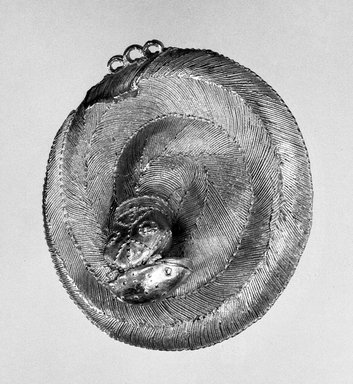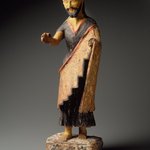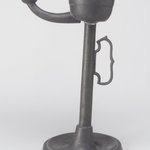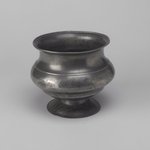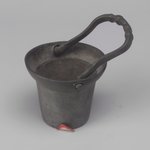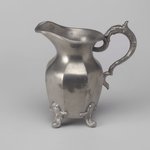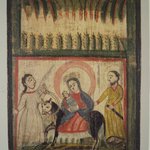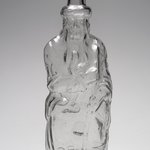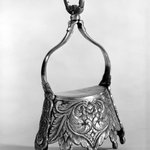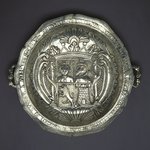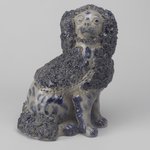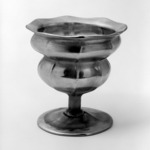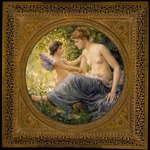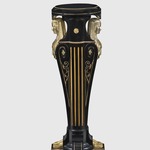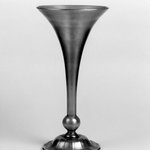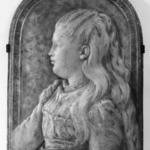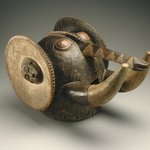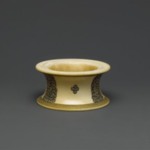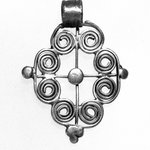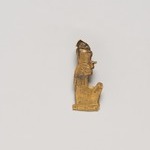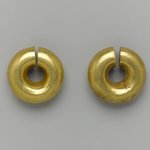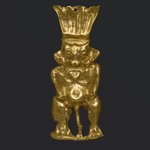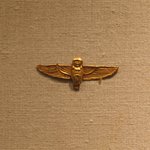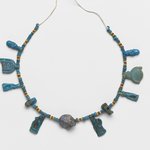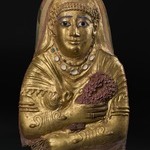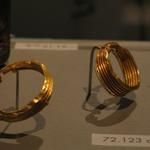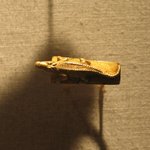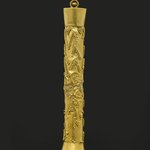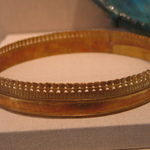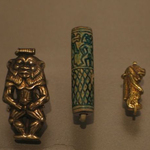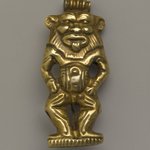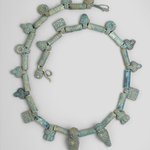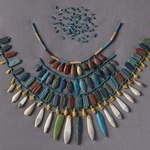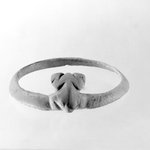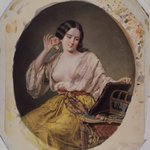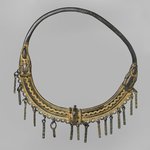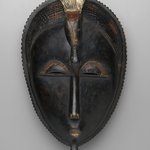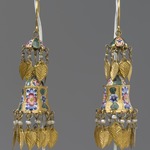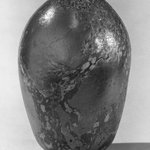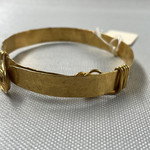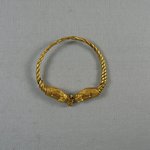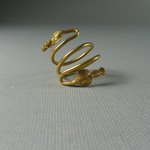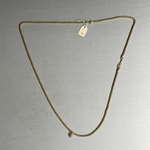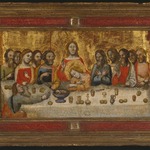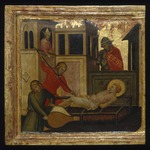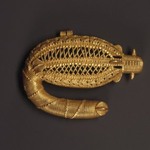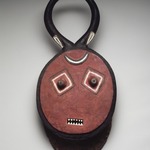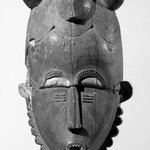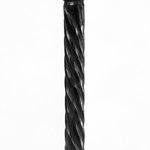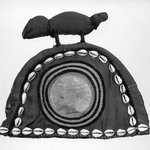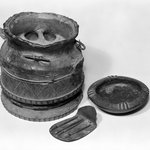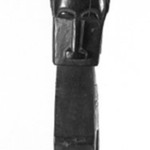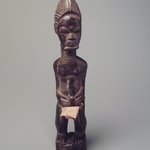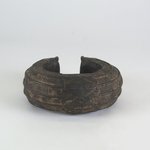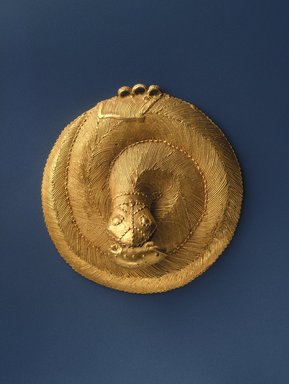

Ebrié. Snake Pendant, 19th century. Gold, diameter: 3 9/16 in. (9 cm). Brooklyn Museum, Frank L. Babbott Fund, 54.161. Creative Commons-BY (Photo: Brooklyn Museum, 54.161_SL1.jpg)
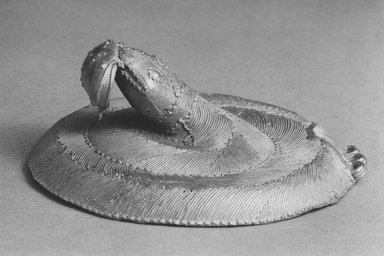
Ebrié. Snake Pendant, 19th century. Gold, diameter: 3 9/16 in. (9 cm). Brooklyn Museum, Frank L. Babbott Fund, 54.161. Creative Commons-BY (Photo: Brooklyn Museum, CUR.54.161_print_view1_bw.jpg)

Ebrié. Snake Pendant, 19th century. Gold, diameter: 3 9/16 in. (9 cm). Brooklyn Museum, Frank L. Babbott Fund, 54.161. Creative Commons-BY (Photo: Brooklyn Museum, CUR.54.161_print_view2_bw.jpg)
Snake Pendant
Arts of Africa
In societies without hereditary chiefs, such as the Akan-speaking peoples of southern Côte d’Ivoire, political and economic elevation remained open to people with the initiative and skill to advance. Once established as a community leader, an individual commissioned his or her own personal regalia, such as this pendant. To reinforce the point, a person of prominence eventually arranged an “exhibition of gold” to display the depth of his or her personal wealth and to entertain (and feed) the community. The Ebrié say on such occasions that “he [or she] has added something to the family chest.”
PROVENANCE
Museum records suggest that this snake pendant may have once been found in the personal collection of Abrogoua, a “king” (or, at least, a powerful chief) of the Ebrié who died in 1811. From there, it entered the Paris collection of Charles Ratton, a pioneering early dealer in both African and medieval art, who arranged to have the pendant shown in an ethnographic context at the Trocadéro museum, in Paris. In 1938 Ratton sold the work to Frederick Pleasants, a leader in the developing aesthetic approach to African art in New York, who would later serve as curator of the African collection at Brooklyn. In 1944 the pendant found its way into the collection of Alastair B. Martin, an important mid-twentieth-century collector in New York, who finally offered it to Brooklyn.
PROVENANCE
Museum records suggest that this snake pendant may have once been found in the personal collection of Abrogoua, a “king” (or, at least, a powerful chief) of the Ebrié who died in 1811. From there, it entered the Paris collection of Charles Ratton, a pioneering early dealer in both African and medieval art, who arranged to have the pendant shown in an ethnographic context at the Trocadéro museum, in Paris. In 1938 Ratton sold the work to Frederick Pleasants, a leader in the developing aesthetic approach to African art in New York, who would later serve as curator of the African collection at Brooklyn. In 1944 the pendant found its way into the collection of Alastair B. Martin, an important mid-twentieth-century collector in New York, who finally offered it to Brooklyn.
MEDIUM
Gold
DATES
19th century
DIMENSIONS
diameter: 3 9/16 in. (9 cm) (show scale)



COLLECTIONS
Arts of Africa
ACCESSION NUMBER
54.161
CREDIT LINE
Frank L. Babbott Fund
PROVENANCE
Prior to 1938, provenance not yet documented; before 1811, reportedly acquired by Abrogoua of the Ébrié region (now Côte d'Ivoire); by 1938, acquired by Charles Ratton of Paris, France; 1938, purchased from Charles Ratton by Frederick Pleasants of New York, NY; 1949, purchased from Frederick Pleasants by Alastair Bradley Martin of Katonah, NY; 1954, purchased from Alastair Bradley Martin by J. J. Klejman Gallery, New York; October 13, 1954, purchased from J. J. Klejman Gallery by the Brooklyn Museum.
Provenance FAQ
CATALOGUE DESCRIPTION
A coiled snake with head facing downward, holding a toad in its mouth. It was cast cire perdue and constructed of fine adjacent threads. There are 3 hooks for suspension.
Condition: good, except for crude repair to metal next to supporting loops.
EXHIBITIONS
MUSEUM LOCATION
This item is not on view
CAPTION
Ebrié. Snake Pendant, 19th century. Gold, diameter: 3 9/16 in. (9 cm). Brooklyn Museum, Frank L. Babbott Fund, 54.161. Creative Commons-BY (Photo: Brooklyn Museum, 54.161_SL1.jpg)
IMAGE
overall, 54.161_SL1.jpg. Brooklyn Museum photograph
"CUR" at the beginning of an image file name means that the image was created by a curatorial staff member. These study images may be digital point-and-shoot photographs, when we don\'t yet have high-quality studio photography, or they may be scans of older negatives, slides, or photographic prints, providing historical documentation of the object.
RIGHTS STATEMENT
Creative Commons-BY
You may download and use Brooklyn Museum images of this three-dimensional work in accordance with a Creative Commons license. Fair use, as understood under the United States Copyright Act, may also apply.
Please include caption information from this page and credit the Brooklyn Museum. If you need a high resolution file, please fill out our online application form (charges apply).
For further information about copyright, we recommend resources at the United States Library of Congress, Cornell University, Copyright and Cultural Institutions: Guidelines for U.S. Libraries, Archives, and Museums, and Copyright Watch.
For more information about the Museum's rights project, including how rights types are assigned, please see our blog posts on copyright.
If you have any information regarding this work and rights to it, please contact copyright@brooklynmuseum.org.
RECORD COMPLETENESS
Not every record you will find here is complete. More information is available for some works than for others, and some entries have been updated more recently. Records are frequently reviewed and revised, and we welcome any additional information you might have.
